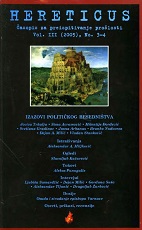Političko besedništvo Laze Kostića
Political oration of Laza Kostić
Author(s): Svetlana GradinacSubject(s): Politics / Political Sciences
Published by: Centar za unapređivanje pravnih studija
Keywords: political oration; romanticism; Austro-Hungarian Assembly; Serbian romanticism; political positions; style of oration
Summary/Abstract: Laza Kostić was the most prominent representative of the mature era of Serbian romanticism. He was a personality of Renaissance spirit, the most educated Serbian of his time, and he marked his time by his work and his political rhetoric. The public rhetorical scene enabled Laza Kostić to express the characteristics that are desirable for a good orator: intellectual richness, eloquence, artistic gift, feeling of rebellion and pride, romantic exultation, patriotism, passion, good memory, free spirit and combativeness as well as good looks. Regardless of all this his oration was not taken into consideration by the compilers of Serbian oration. Maybe the reason for this is the fact that his oration remained in the shadow of his literary work or due to the fact that his best orations were not expressed or on the territory of Serbia but rather in the Hungarian language in the Assembly of the Austro-Hungarian Empire where he was a member of parliament representing the party of Svetozar Miletić. He was elected as a "Sajkas" member of the Parliament of the Austro-Hungarian Empire from the list of the party of Svetozar Miletić in 1873 and with youthful exuberance Laza Kostić gave patriotic and free minded speeches. Most of these speeches and his political commentaries and political opinions were printed in the journal Zastava, the editor of chief of which was Svetozar Miletić. His style of oration was particularly recognizable. He combined intellectual and poetical style which was very rich; in the introduction of the oration he used the principle in medias res; he often used irony, less often a figure of modesty. He regularly used apostro-phe, dialogue, rhetorical questions and puns. He gave many examples as argument by which he showed a great knowledge of antique culture and history, international law, classical literature, ethics, aesthetics and philosophy.
Journal: HERETICUS - Časopis za preispitivanje prošlosti
- Issue Year: 2005
- Issue No: 3-4
- Page Range: 36-44
- Page Count: 9
- Language: Serbian

